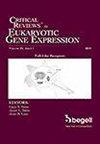DLEU2/EZH2/GFI1 axis regulates the proliferation and apoptosis of hBMSCs
IF 1.5
4区 医学
Q4 BIOTECHNOLOGY & APPLIED MICROBIOLOGY
Critical Reviews in Eukaryotic Gene Expression
Pub Date : 2023-01-01
DOI:10.1615/critreveukaryotgeneexpr.2023050337
引用次数: 0
Abstract
Long non-coding RNAs (lncRNAs) has become a vital regulator in the pathogenesis of osteoporosis (OP). This study aimed to investigate the role of lncRNA DLEU2 in the development of proliferation and apoptosis of hBMSCs. High-throughput sequencing in bone tissues from 3 pairs healthy donors and OP patients was used to search for differential lncRNAs. The expression of DLEU2 was also verified in bone tissues. The hBMSCs were transfected with DLEU2 ASO. Cell viability was detected suing MTT. Cell proliferation was determined using colony formation and EdU assays. Cell cycle and apoptosis was detected using flow cytometry. RIP, RNA pulldown, and Co-IP assays were carried out to verify the interaction between protein and protein/RNA. The binding sites between GFI1 and the promoter of DLEU2 was verified using ChIP and luciferase assays. DLEU2 expression was down-regulated in OP patients. Knockdown of DLEU2 expression significantly inhibited proliferation and promoted apoptosis of hBMSCs via up-regulating the expression of Bax and Caspase3. Moreover, DLEU2 could interact with EZH2 to induce the activation of GFI1. Additionally, GFI1 transcriptionally activated DLEU2. Taken together, DLEU2/EZH2/GFI1 axis suppressed proliferation and enhanced hBMSC apoptosis. This may provide novel strategy for OP.DLEU2/EZH2/GFI1轴调控hBMSCs的增殖和凋亡
长链非编码rna (lncRNAs)已成为骨质疏松症(OP)发病机制中的重要调控因子。本研究旨在探讨lncRNA DLEU2在hBMSCs增殖和凋亡过程中的作用。对3对健康供体和OP患者的骨组织进行高通量测序,以寻找差异lncrna。在骨组织中也证实了DLEU2的表达。用DLEU2 ASO转染hBMSCs。用MTT检测细胞活力。用菌落形成和EdU测定细胞增殖。流式细胞术检测细胞周期和凋亡。采用RIP、RNA pull - down和Co-IP实验验证蛋白与蛋白/RNA之间的相互作用。GFI1与DLEU2启动子之间的结合位点通过ChIP和荧光素酶测定验证。在OP患者中,DLEU2表达下调。敲低DLEU2表达可通过上调Bax和Caspase3的表达,显著抑制hBMSCs的增殖,促进细胞凋亡。此外,DLEU2可以与EZH2相互作用,诱导GFI1的激活。此外,GFI1转录激活了DLEU2。综上所述,dele2 /EZH2/GFI1轴抑制hBMSC增殖,增强hBMSC凋亡。这可能为OP提供新的策略。
本文章由计算机程序翻译,如有差异,请以英文原文为准。
求助全文
约1分钟内获得全文
求助全文
来源期刊

Critical Reviews in Eukaryotic Gene Expression
生物-生物工程与应用微生物
CiteScore
2.70
自引率
0.00%
发文量
67
审稿时长
1 months
期刊介绍:
Critical ReviewsTM in Eukaryotic Gene Expression presents timely concepts and experimental approaches that are contributing to rapid advances in our mechanistic understanding of gene regulation, organization, and structure within the contexts of biological control and the diagnosis/treatment of disease. The journal provides in-depth critical reviews, on well-defined topics of immediate interest, written by recognized specialists in the field. Extensive literature citations provide a comprehensive information resource.
Reviews are developed from an historical perspective and suggest directions that can be anticipated. Strengths as well as limitations of methodologies and experimental strategies are considered.
 求助内容:
求助内容: 应助结果提醒方式:
应助结果提醒方式:


